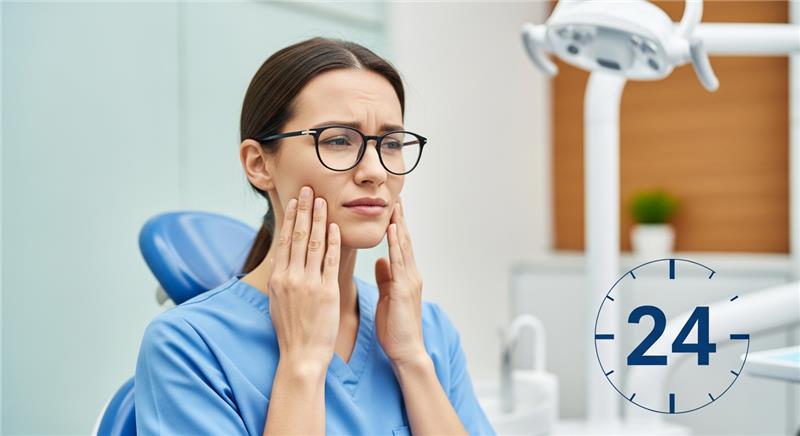Aftercare for Same-Day Implants: What to Do in the First 24 Hours and Beyond
On the same day as the surgical operation, which is often called “same day teeth” or implants in one day can be an efficient way to restore your smile quickly. However, a good dental implant is a lasting one.
Maintain proper aftercare to protect your “one-day” implant. This will help promote healing and discourage infections, as well as maintain the osseointegration process in which the bone and implant fuse together.
What to Do in the First 24 Hours After Having Same-Day Implants
The first 24 hours after you get same-day dental implants are crucial for healing and stability. Proper care during this period also helps minimize swelling, prevent infection present only in such environments and the signs of sickness where it festers to become chronic. A dentist in Feasterville will help to minimize the pain and will give your recommendations on how to take care of your implants.
You also need to maintain a high protein intake for better blood circulation and faster recovery. Having just done with your dental implants, protection of these new teeth is vital for their success. Besides, good oral hygiene practices will help prevent gum disease. Another potential hazard following implantation gingivitis which is bleeding from the gums.
First 24 Hours: Critical Care
Rest and keep your head elevated
After your same-day dental implant placement, you’ll want to rest and avoid strenuous activities. Elevate your head with a couple of pillows to help reduce swelling.
Ice application to reduce swelling
First, a cold pack or a warm compress should be applied to the side of your face for 20-30 minutes. After that, take it off and do not put anything on top of it. To decrease swelling & reduce pain take the cold pack off and switch sides.
Avoid rinsing, spitting or using a straw
Soft, cool fluids and easy foods
After the local anaesthetic has worn off, take cool or just-lukewarm liquids and soft foods. Some foods to be consumed after dental implant surgery such as yogurt, milkshakes and mashed potatoes. Avoid hot liquids, spicy foods or anything that’s difficult to chew.
Medication as prescribed
Take over-the-counter or prescribed painkillers and antibiotics exactly as your dentist or oral surgeon instructed. Do not stop antibiotics early.
Avoid smoking and alcohol
They can significantly interfere with the healing process, making it more likely to get infected or have an implant failure. Stay away from them for at least 48 hours.
Days 2-7: Transition and Gentle Care
Begin gentle rinsing
After the first 24 hours, you can start gentle warm salt-water rinses ½ teaspoon salt in 8 oz warm water, 2-3 times daily, especially after meals.
Brush carefully
You may brush your other teeth normally, but around the implant site use a soft-bristled toothbrush or Q-tip and avoid disturbing the surgical area. Some instructions recommend waiting until day two.
Continue a soft diet and avoid chewing on the implant side
Don’t chew directly on the implant site until your dentist says it’s safe. Avoid crunchy, sticky, hard foods (nuts, chips, popcorn) which can cause damage or infection.
Limit physical activity
When you start moving around, do not exert yourself with heavy exertion or heavy heavy lifting for several days. Increased blood pressure and movement is liable to cause inflammation and bleeding.
Long-Term Oral Care: Weeks to Full Healing
Maintain excellent oral hygiene. Brushing twice daily, flossing daily around your implants once your dentist approves, and using an antibacterial mouthwash will help implant longevity.
Avoid smoking long-term
In any case, smoking is perhaps one of the most critical factors for implant failure. It hinders blood flow and over time will compound inelasticity or hardening of the arteries.
Schedule regular dental check-ups
Your dentist or oral-surgeon will monitor how well your same-day implant is integrating with the bone, check for gum health around the implant and confirm your prosthetic restoration is functioning well.
Be patient
Osseointegration takes time. Though your implant may appear and feel stable, the bone bonding process continues for months. Therefore, you must not bite on it or exert heavy forces against it until your dental professional advises otherwise.
Looking for a same-day implant solution? Contact Miracle Dental Center
Same-day implants mean your tooth can be restored all in one day. You are ready for work again. However, aftercare beds in properly from the first 24 hours through to the first week and leaves little doubt that your same day implants are healing. At Miracle Dental Center, we help you heal after the same-day implant treatment.
If you experience any excessive bleeding, uncontrolled pain, fever or unexpected swelling please contact our dentists at 267-990-8668 immediately. However, good aftercare for same-day implants really makes the difference. Your sustained attention to the necessary program guarantees a successful result and long-term rewards in your life.
Frequently Asked Questions on Same-Day Implants
1. How long does it take to recover from same-day dental implants?
Most patients recover from same-day dental implants within 7 to 10 days, although complete healing and osseointegration can take 3 to 6 months.
2. What should I avoid after getting same-day dental implants?
For at least the first 24–48 hours, avoid smoking, alcohol, hard or spicy foods, and using straws, as these can disrupt healing and cause complications.
3. How do I reduce swelling after same-day implants?
To reduce swelling after same-day implants, apply an ice pack to the cheek near the treated area for 20 minutes on and 20 minutes off during the first 24–48 hours.
4. Is pain normal after same-day dental implants?
Yes, mild pain or soreness is normal for the first few days after same-day dental implant placement. Over-the-counter pain relievers or prescribed medication can help manage discomfort.

